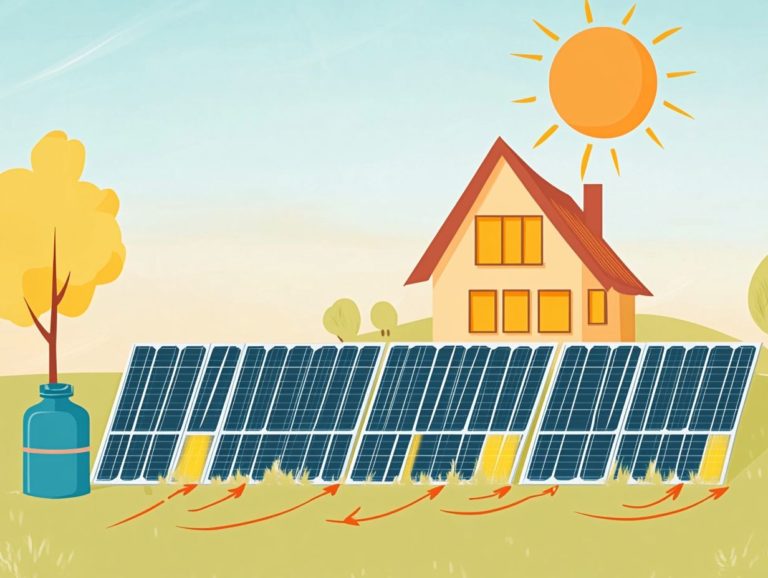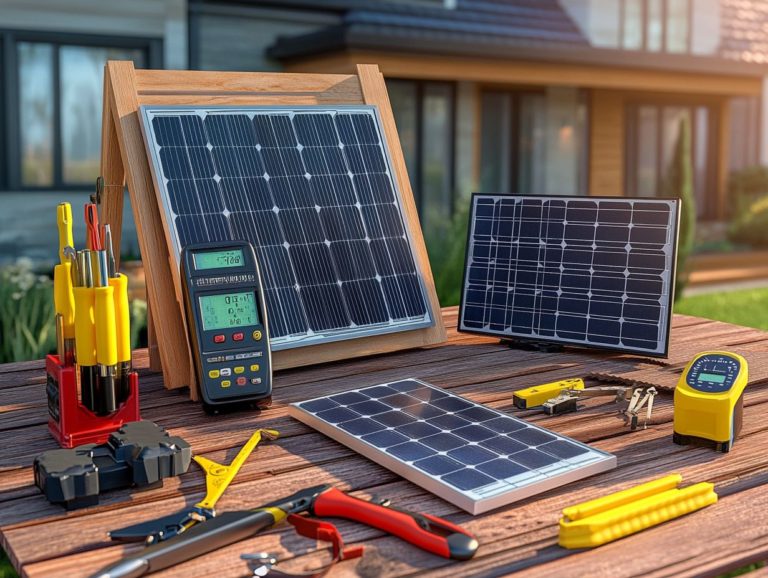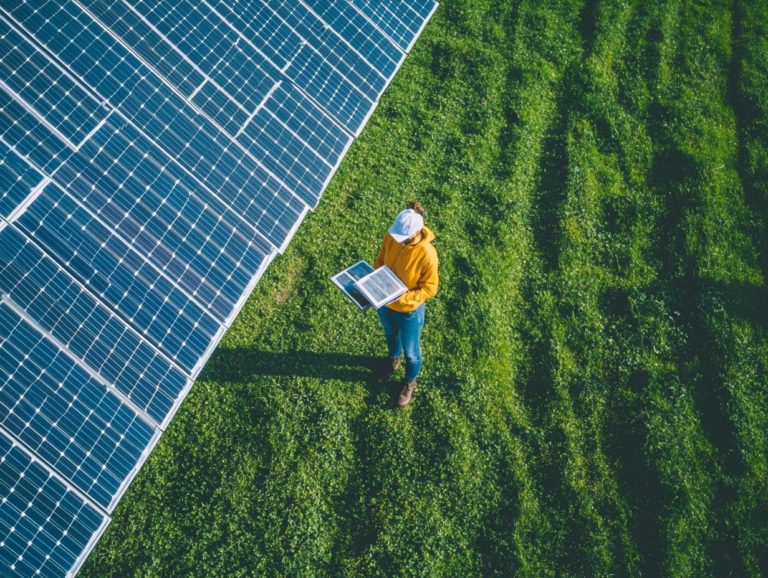“How Weather Affects Solar Energy Production”
Solar energy stands out as a powerful and renewable resource, yet its efficiency is subject to various influencing factors.
Weather conditions, geographical location, and seasonal variations can significantly affect sunlight intensity and energy production. This exploration delves into how weather impacts solar energy generation and offers strategies to mitigate these effects while highlighting technological innovations on the horizon.
Get ready to explore the intricacies of solar energy and discover its promising future potential.
Contents
- Key Takeaways:
- What is Solar Energy?
- Factors Affecting Solar Energy Production
- How Weather Impacts Solar Energy Production
- Maximizing Solar Energy Production
- Future of Solar Energy Production
- Frequently Asked Questions
- 1. How does cloudy weather affect solar energy production?
- 2. Does cold weather impact solar energy production?
- 3. How does temperature affect solar energy production?
- 4. Can rain affect solar energy production?
- 5. How does wind affect solar energy production?
- 6. Does the time of year affect solar energy production?
Key Takeaways:
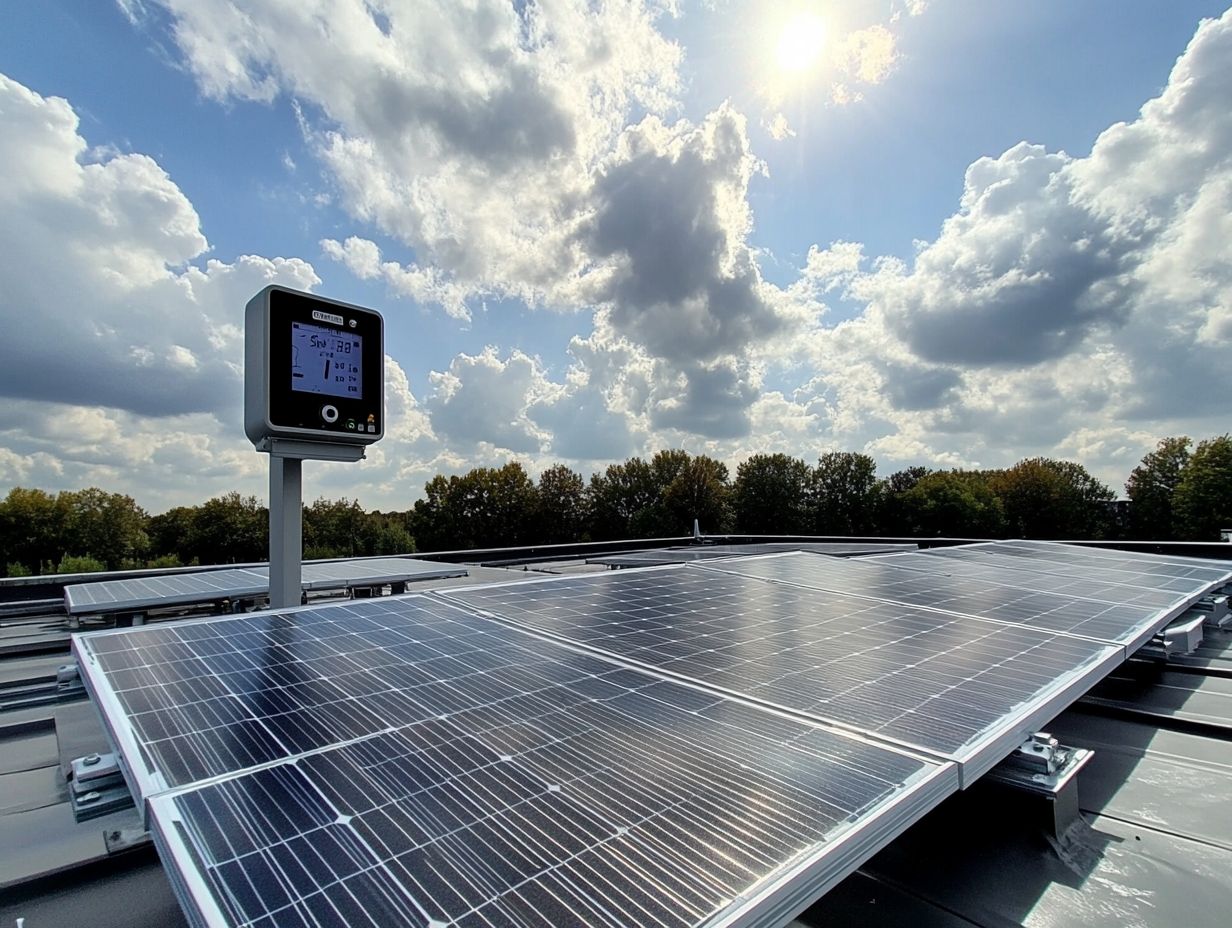
- Weather conditions play a crucial role in solar energy production, affecting sunlight intensity and duration.
- Temperature and cloud cover also impact the efficiency of solar panels.
- Consider geographical location and time of day/season to maximize solar energy production.
- Strategies like backup storage and adjustable panels can help mitigate the effects of weather variations.
What is Solar Energy?
Solar energy is the radiant energy harnessed from the sun, primarily through photovoltaic systems, which are devices that convert sunlight into electricity. This renewable energy source provides numerous benefits, such as reducing carbon emissions, achieving energy independence, and saving significantly on costs as a homeowner.
With the integration of advanced technologies, solar panels have become more efficient and affordable over time. These panels consist of multiple solar cells that capture sunlight and generate electrical energy, positioning them as a cornerstone of both residential and commercial energy solutions.
The versatility of solar applications extends beyond generating electricity; it can power everything from homes and businesses to transportation and agricultural practices. Innovations like solar batteries and smart energy systems enhance how energy is stored and managed.
The role of solar energy is increasingly crucial in shaping a sustainable future and tackling climate change head-on.
Factors Affecting Solar Energy Production
Several factors influence solar energy production, including weather conditions, geographical locations, and the efficiency of solar panels.
Each of these elements plays a vital role in determining how effectively photovoltaic systems convert sunlight into electric current. Understanding the interplay of these factors allows you to optimize your solar power system for maximum energy savings and performance.
Weather Conditions
Weather conditions, including sunlight intensity, temperature, and precipitation, significantly affect how well your solar panels and photovoltaic systems perform. Snow accumulation can block solar energy systems, while strong winds can test the durability of your installation.
Cloudy days and extended rain can limit the sunlight reaching your panels, ultimately lowering energy output. Conversely, extreme heat can cause overheating, diminishing efficiency.
As a homeowner relying on solar power, it s essential to account for these weather variations. Regular maintenance is vital for optimizing energy production. Scheduling professional check-ups ensures your panels remain clear of debris and snow, while protective coatings can shield them from harsh elements.
By proactively addressing these challenges, you can enhance your solar investment and maximize energy efficiency, regardless of the weather.
Geographical Location
Geographical location is critical in determining the solar potential and efficiency of solar energy systems. If you live in areas with abundant sunlight and minimal cloud cover, you are in an optimal location for maximizing photovoltaic energy production, making it an ideal choice for solar panel installation.
Latitude matters; regions closer to the equator receive more direct sunlight throughout the year, enhancing energy generation. Altitude also plays a role; higher elevations often enjoy clearer skies, further boosting sunlight availability. Local climate variations, such as humidity and seasonal weather patterns, can greatly influence overall energy efficiency.
You can leverage advanced energy monitoring systems to analyze these geographical factors, gaining insights into your location’s solar viability. By assessing real-time data on sunlight exposure and weather conditions, you can make informed decisions regarding solar energy investments tailored to your unique environment.
Start your solar journey today!
Time of Day and Season
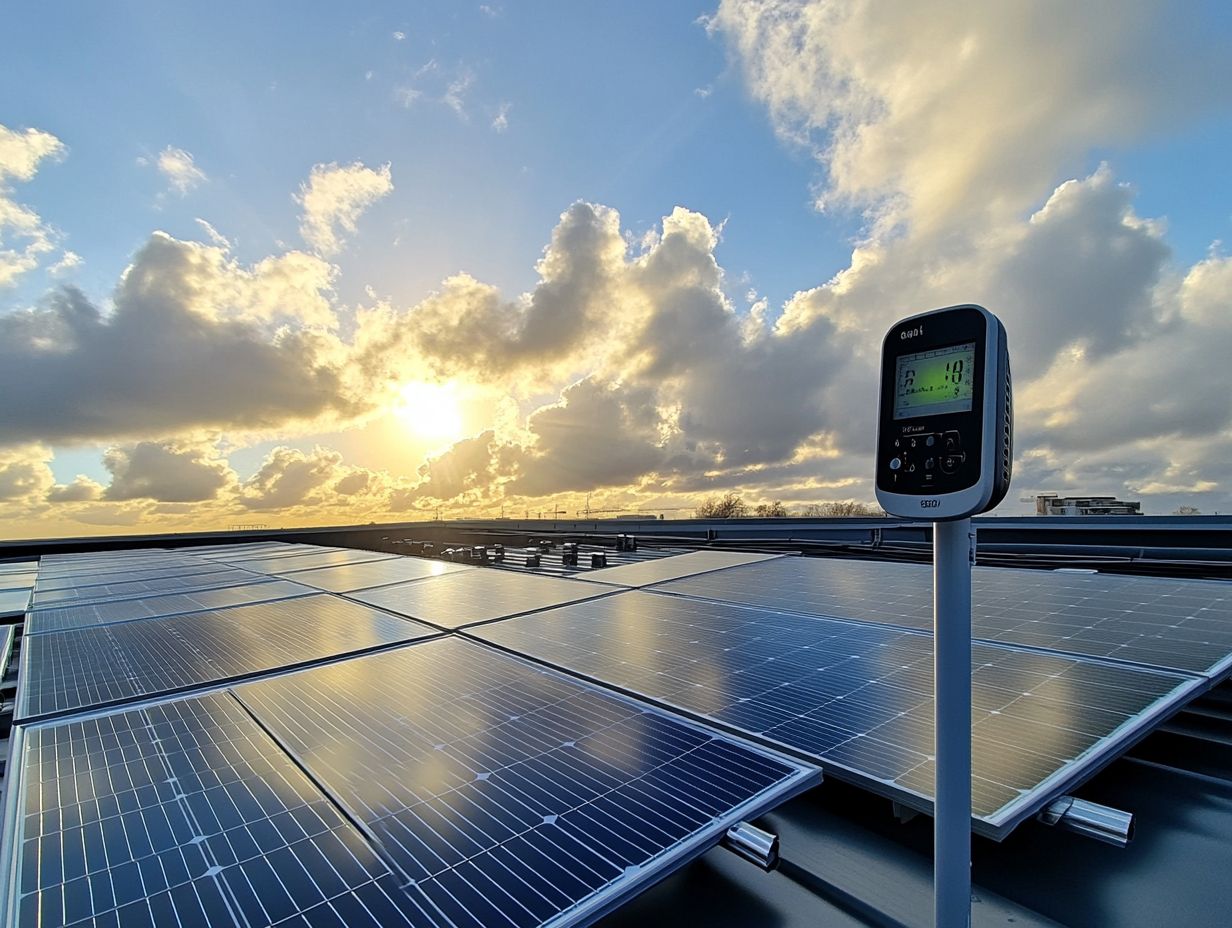
The time of day and season greatly affects solar energy production, as sunlight intensity and duration fluctuate throughout the year.
Explore exciting solar technologies like solar trackers to supercharge your energy capture! These devices optimize energy capture by adjusting to changes in sunlight availability.
By dynamically positioning solar panels to track the sun s path, these trackers can significantly enhance efficiency, especially during peak solar hours.
Energy monitoring systems are essential for assessing your solar setup’s performance over time. They help you fine-tune your strategies when things aren t performing as expected.
Take winter months, for instance, with their shorter daylight hours. This is the perfect time to adjust your energy consumption habits or invest in more efficient storage solutions to ensure a steady power supply.
By understanding local weather patterns and seasonal changes, you can make smarter decisions to better plan and utilize solar energy, ultimately maximizing your output and sustainability.
How Weather Impacts Solar Energy Production
Weather plays a significant role in solar energy production, influencing the performance of solar panels and causing fluctuations in energy output.
Grasping these effects is essential for homeowners. It allows you to optimize energy savings and fully embrace the environmental advantages of clean energy.
Sunlight Intensity and Duration
Sunlight intensity and duration are pivotal factors that determine how much energy your solar panels can produce. When sunlight intensity is high, energy production increases. However, variations in duration throughout the day and seasons can impact overall system efficiency.
Understanding how temperature affects performance is crucial. This is where the temperature coefficient comes in it shows how your panels respond to temperature changes.
If you re ready to maximize your solar energy yield, check your system s location and orientation! Ensuring it captures the most direct sunlight possible throughout the day is key.
Regular maintenance, like cleaning and inspecting your panels, significantly boosts energy capture, allowing you to harness the full potential of available sunlight.
Temperature and Cloud Cover
Temperature and cloud cover are crucial factors that influence the efficiency and energy production of your solar panels. High temperatures can cause energy loss, while thick cloud cover reduces sunlight availability, ultimately diminishing the effectiveness of your solar energy systems.
These elements affect not just your immediate output; they also play a significant role in long-term performance. For example, as temperatures rise, the efficiency of solar cells may decline, potentially leading to reduced energy generation.
On the other hand, varying degrees of cloud cover can create inconsistent energy production, complicating your planning and energy storage strategies.
To address these challenges, regular maintenance practices are essential. By keeping your panels clean and free from debris, as well as scheduling professional inspections, you can ensure optimal performance and longevity.
Maximizing Solar Energy Production
To maximize solar energy production, prioritize effective installation practices and establish regular maintenance routines that enhance the efficiency of your solar panels.
By embracing the latest advancements in solar technology, you can significantly boost energy output and ensure that your systems operate at their peak performance.
Strategies for Dealing with Weather Variations
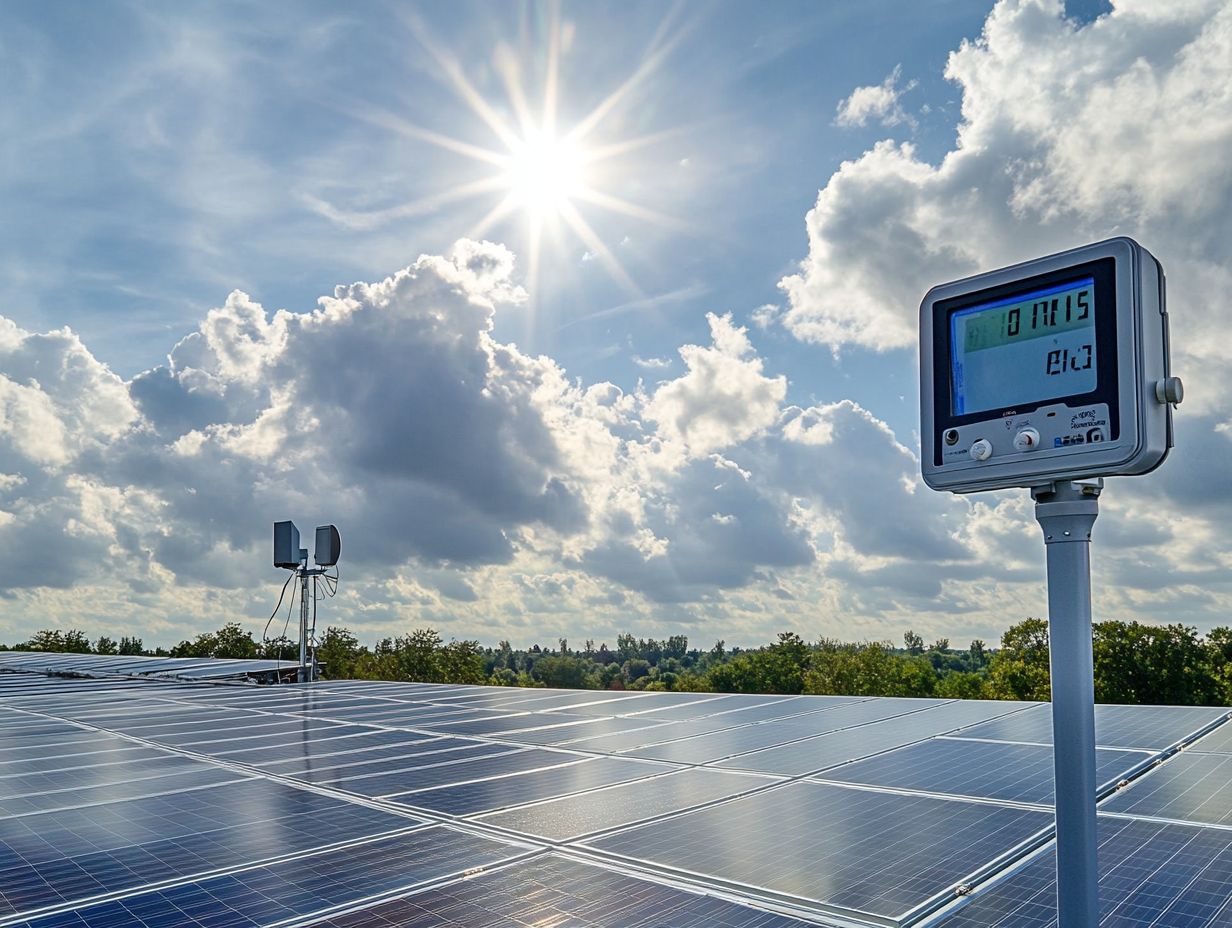
Implementing effective strategies to navigate weather variations is crucial for maintaining optimal solar panel performance and maximizing energy savings. You have various techniques to enhance the durability and efficiency of your solar energy systems.
One essential approach is applying protective coatings to your panels. This shields them from harsh elements like rain, hail, and snow. Regular maintenance is equally important. Conducting routine inspections helps catch potential issues, such as dirt buildup or minor cracks, before they escalate into larger problems.
Adopting best installation practices can boost performance. For example, angling your panels minimizes debris accumulation and ensures proper drainage. By combining these strategies, you can keep your solar systems efficient and resilient against unpredictable weather.
Future of Solar Energy Production
The future of solar energy production holds great promise. Continuous advancements in solar technology and a growing commitment to renewable resources fuel this progress.
As innovative solutions emerge, you will see exciting new benefits from solar energy. This will significantly enhance both performance and accessibility for homeowners.
Innovations and Advancements in Technology
Innovations in solar technology are transforming the landscape of solar energy production. Solar power systems are becoming more efficient and accessible to a wider audience. These developments empower you to enhance your energy independence while taking full advantage of various solar incentives available.
Recent breakthroughs in material quality, especially with a new type of solar technology known as perovskite cells, significantly improve conversion efficiencies. This allows your system to capture more sunlight and generate even more power.
Microinverters now allow you to monitor and optimize energy output at the individual panel level. This ensures greater reliability for your solar setup.
Financial incentives such as tax credits and rebates ease the initial investment burden. This makes the transition to solar energy even more manageable.
As these advancements continue to unfold, they play a vital role in creating a more sustainable and eco-friendly energy landscape for future generations.
Frequently Asked Questions
1. How does cloudy weather affect solar energy production?
Cloudy weather can significantly reduce solar energy production because clouds block sunlight from reaching the solar panels. This decreases their efficiency and overall energy output.
2. Does cold weather impact solar energy production?
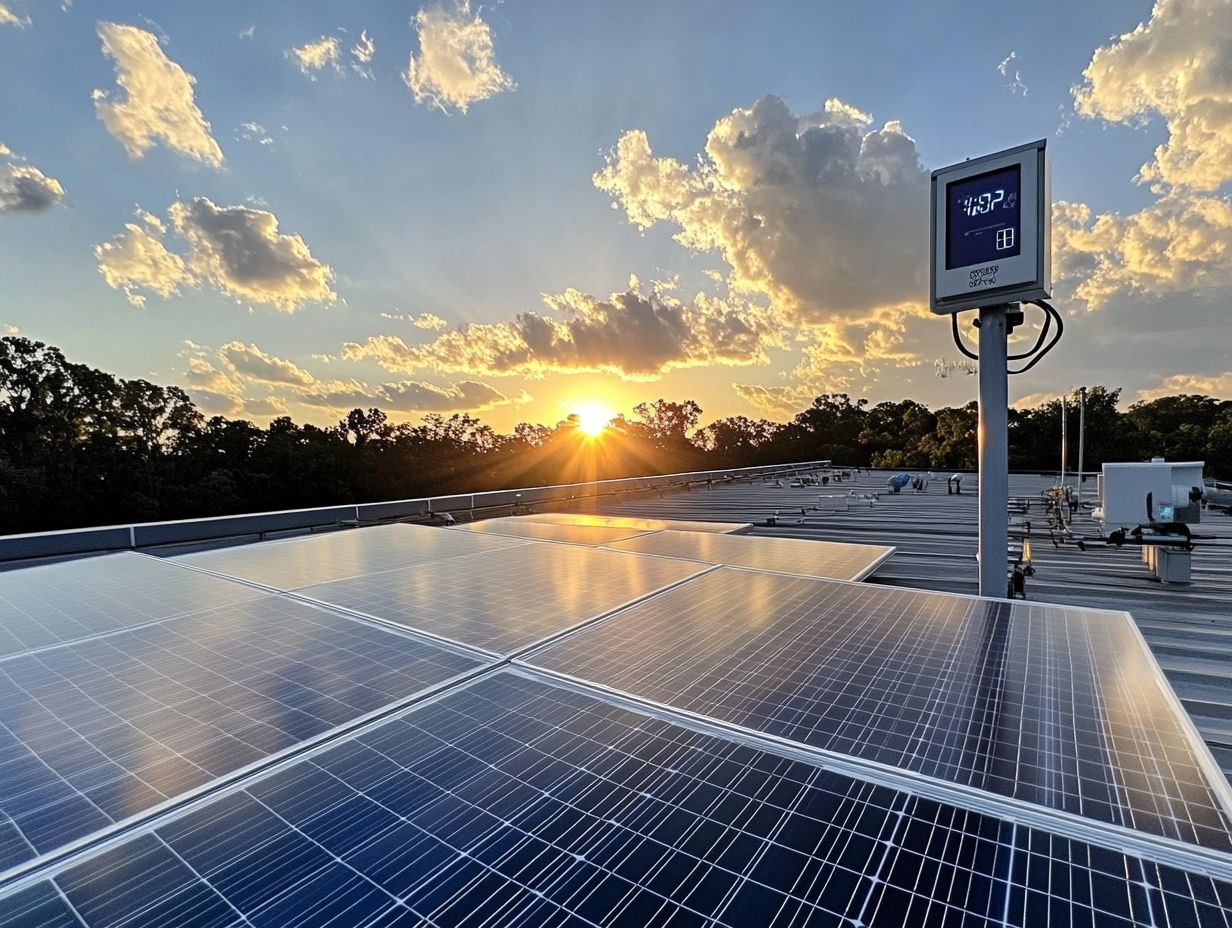
Cold weather can actually benefit solar energy production. Solar panels work more efficiently in cooler temperatures, which can increase their output. However, heavy snow or frost can cover the panels and decrease their effectiveness.
3. How does temperature affect solar energy production?
Extreme temperatures, whether hot or cold, can negatively impact solar energy production. High temperatures can cause solar panels to overheat and reduce their efficiency. Very low temperatures can cause them to freeze and become less effective.
4. Can rain affect solar energy production?
Rain usually has a small effect on solar panels. Light rain or drizzle will not significantly affect energy production. However, heavy rain or storms can block sunlight and cause the panels to operate at a lower capacity.
5. How does wind affect solar energy production?
Strong winds can potentially damage solar panels or cause misalignment, reducing their efficiency and energy production. However, a moderate breeze can help keep the panels cool and improve their performance.
6. Does the time of year affect solar energy production?
Yes, the time of year can definitely affect solar energy production. In the summer, longer daylight hours and more direct sunlight lead to higher energy output from solar panels.
In the winter, shorter days and less direct sunlight reduce energy production. Weather changes throughout the year also play a role in how much energy is generated.



